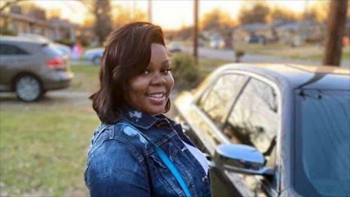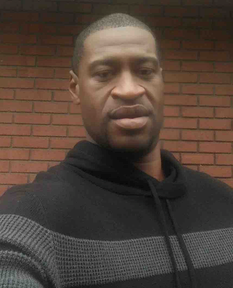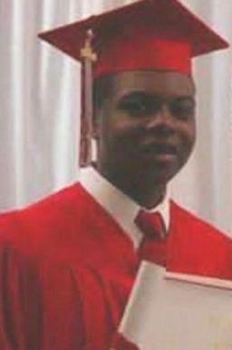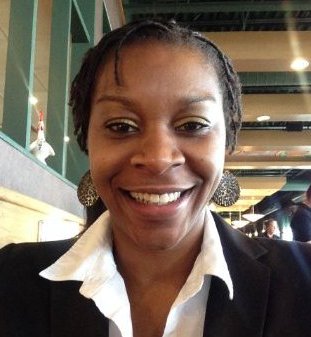Last week my son and I biked down the Point Loma peninsula and up to the Cabrillo National Monument that's perched over 400 feet above the Pacific Ocean. At the top of this National Park there's a 14-foot statue of Juan Rodríguez Cabrillo, who landed at San Diego Bay on September 28, 1542. He's the first known European to set foot on what eventually became the west coast of the United States. Cabrillo is dressed in military armor. In his left hand, Cabrillo the navigator holds a quadrant and a plotting compass. In his right hand, Cabrillo the conquistador wields an enormous and ominous sword.
 |
|
Breonna Taylor.
|
In Cabrillo's day, some 300,000 Native Americans lived in today's California. Whatever "civilizing" good the Spanish Empire brought here, the cultural clash led to the extermination of 95% of these indigenous peoples due to race-based violence and the infectious diseases that the Europeans brought to the "heathens" — measles, smallpox, chickenpox, cholera, malaria, scarlet fever, typhoid, tuberculosis, and more. There were similar, dreadful outcomes after Juan Ponce de León landed on the Atlantic coast of La Florida in 1513.
In order to get to the Cabrillo Monument, you pass through two military bases. You also pass the Fort Rosecrans National Cemetery with its 101,079 beautifully manicured graves of American veterans.
Just as I was feeling smug about condemning the sins of Spain, it occurred to me that America, like Spain and many other world powers (the British, Mongols, Russians, etc.), has built its own version of global empire — about 800 military bases in 60 countries, from which in any given year it will conduct operations in 170 countries. In his book How to Hide an Empire (2019), Daniel Immerwahr notes that at the end of World War II, the American mainland had a population of 132 million, which was dwarfed by the "colonized population" of 135 million people who lived in the U.S.'s many territories, possessions, commonwealths, mandates, dominions, and "strategic trusts" like Micronesia.
 |
|
George Floyd.
|
The week that I biked to the Cabrillo Monument, I also read Greg Grandin's Pulitzer Prize book The End of the Myth: From the Frontier to the Border Wall in the Mind of America (2019). It's a sweeping history of the "frontier thesis" — the optimistic myth that the seemingly endless expansion westward in American history created a unique form of political equality for all of our citizens, a vibrant, forward-looking individualism, social and economic progress, the reduction of racism, and the end of poverty.
That's the thesis, but as Grandin shows, reality has been very darkly different. This cheery myth of the endless expansion of American ideals came at a horrifying cost to people of color. Embedded in the myth was a perpetual race-based violence toward indigenous Americans, Mexicans, African Americans, Chinese, Japanese Americans, Filipinos, Vietnamese, Eastern Europeans, and today's Latinos. This myth has now ended, says Grandin, for the gap between the political promises and the actual fulfillment has become a yawning chasm.
Imperial expansion included a messianic sense of American exceptionalism and white supremacy, which could mean exclusion, extermination, and extinction for those who were either ignored or targeted for "liberation." That, in turn, led to political "blowback" and retaliation by those who were victimized, and thus a recurring cycle of violence.
 |
|
Laquan McDonald.
|
Grandin calls this America's founding paradox: "the promise of political freedom and the reality of racial subjugation." The United States has struggled with this foundational paradox for 240 years. Despite important successes, and all the aspirational language, studies, commissions, promises, and legislative reforms, we have failed to extend all the benefits of our social contract to all of our citizens — education, health care, employment, housing, criminal justice, etc.
In 1967, President Lyndon Johnson established the Kerner Commission in order to understand the race riots of that day. Remarkably, the 426-page report became a best seller. Its most famous passage warned us over fifty years ago, "Our nation is moving toward two societies, one black, one white — separate and unequal. What white Americans have never fully understood but what the Negro can never forget — is that white society is deeply implicated in the ghetto. White institutions created it, white institutions maintain it, and white society condones it."
The race-based violence that characterizes Grandin's paradox, and the spasms of violent blowback, are what we are now experiencing. There have been protests in over 400 cities throughout all 50 states, and others all around the world, following the homicide of George Floyd. And so in her recent op-ed in the New York Times, Roxanne Gay observed that whereas white people are eager to get back to "normal," Floyd's death is a reminder that for people of color a return to normal is exactly what we do not need.
Martin Luther King, Jr. was famously committed to non-violent resistance. He thought that the riots and violence of his day were socially destructive and even self-defeating: they would only continue the endless cycle of violence. They did more harm than good. Besides, the federal government always had far more power to wield than protesters.
 |
|
Sandra Bland.
|
Nonetheless, King insisted that there are reasons for riots, and that we must understand them. They don't just happen. He understood what Grandin calls the blowback against 240 years of race-based violence. In a speech at Stanford University on April 14, 1967 called "The Other America," King famously called riots the language of the unheard.
"It is as necessary for me to be as vigorous in condemning the conditions which cause persons to feel that they must engage in riotous activities as it is for me to condemn riots. I think America must see that riots do not develop out of thin air. Certain conditions continue to exist in our society which must be condemned as vigorously as we condemn riots. But in the final analysis, a riot is the language of the unheard. And what is it that America has failed to hear? It has failed to hear that the plight of the Negro poor has worsened over the last few years. It has failed to hear that the promises of freedom and justice have not been met."
Only the federal government can fully redress institutional problems of social inequity of this magnitude and complexity. But we Christians have our own responsibilities. We have inherited the responsibility from our Jewish forbears to speak up for those who have no voice, to protect the rights of the weak and vulnerable, to defend the dignity of every human being, and to do justice. Having just entered the season of Pentecost, let us listen to the language of the unheard, and hear what the Spirit is saying to God's people.
Dan Clendenin: dan@journeywithjesus.net
Image credits: (1) MotherJones; (2) Wikipedia.org; 2) Wikipedia.org; and (3) Wikipedia.org.



